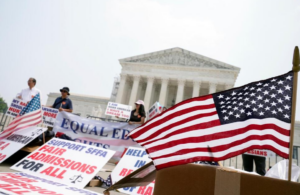The ruling means that colleges and universities are prohibited from considering an applicant’s race as a factor in their admissions process. This decision has implications for the ongoing debate over affirmative action and its role in promoting diversity in higher education.

The Supreme Court has issued two separate opinions ruling against the use of race in college admissions. The decisions overturn decades of precedent and are expected to have significant implications for higher education, potentially resulting in fewer Black and Hispanic students enrolling in elite schools. Chief Justice John Roberts, writing for the court’s conservative majority, argued that admissions programs at Harvard University and the University of North Carolina lack clear objectives and employ race in a negative manner, thus violating the Equal Protection Clause. The opinions split along ideological lines, with Justices Sonia Sotomayor, Elena Kagan, and Ketanji Brown Jackson dissenting.
The case against Harvard alleged that its admissions policy discriminates against Asian American applicants, while the case against UNC claimed discrimination against white and Asian American applicants. Both schools defended their use of race as one factor among many in admission decisions, arguing that eliminating the practice would lead to a significant decrease in the number of minority students on campus.
Critics of the court’s decisions argue that they undermine progress made in addressing systemic racism and perpetuate a superficial notion of colorblindness. They contend that race-conscious admissions policies are necessary to correct for inequities in K-12 education and ensure diversity on college campuses.
The lawsuits were filed by Students for Fair Admissions, an advocacy group opposing race-based admissions policies. The group argued that such policies discriminate against Asian American applicants and limit their opportunities for admission. However, the challenge was opposed by a range of organizations, including Asian American groups that supported race-conscious admission policies and accused the group of misrepresenting Asian Americans as a monolith.
The opinions mark a significant shift in the admissions landscape and could reshape policies across higher education. The decision comes at a time when colleges and universities are already facing enrollment declines, particularly among students of color. President Joe Biden called on institutions to continue using race, income, and other measures of diversity and adversity in their admissions processes, emphasizing the need to address discrimination that still exists in America.
Currently, nine states prohibit the use of race in admissions policies at public colleges and universities. College and university leaders have been exploring alternative strategies to promote diversity, such as making standardized tests optional and considering socioeconomic factors, but research suggests that race-conscious admissions remain crucial for achieving meaningful diversity.